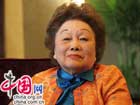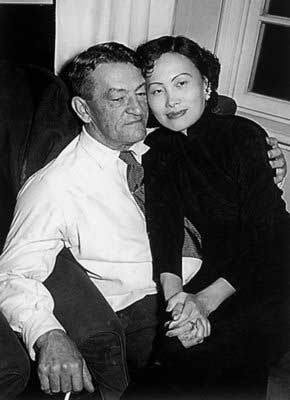| Videos | ? Latest |
|
? Feature | ? Sports | ? Your Videos |
Anna Chennault: Sino-US 'secret ambassador' (7)

Plane engines roaring, white clouds and landscapes receding underneath, Anna Chan Chennault sat quietly and stared through the window at the horizon. It was nearly impossible for her to remember how many times she had returned to the vast land of China.
Shrewd, rich, perceptive, one half of a world-famous love story, respected, at least in certain quarters, Anna, though more than 85 years old, still seemed full of energy. The plane flew north from Beijing, taking her to Erdos, the richest city in the Inner Mongolia Autonomous Region. It was her first trip there.
"I have heard it is a very beautiful place and where Genghis Khan is buried," she said. "China is changing so much and everyone should come to see."
A legend in the Chinese community, Anna is famous for many reasons. She was the wife of "Flying Tigers" leader General Claire Chennault, the first female reporter for the Central News Agency, and the first person of Chinese ancestry who have had a successful political career in the United States, where she became known as "the hostess of Washington."
Often acting as a "secret ambassador," she served as an emissary for interactions among the Chinese mainland, Taiwan and U.S. Over the past eight decades, she has devoted all her life to promoting dialogue and exchange between the two sides of the Pacific Ocean. She has published an autobiography and several collections of writings. Numerous TV serials based on her life have been produced and broadcast in Taiwan and the mainland.
"I love both China and U.S. very much!" Anna told China.org.cn. "I member the toast made by President Nixon in 1972 when he came to Beijing,that 'The Chinese people are a great people, the American people are a great people. If we can find common ground to work together, the chance for world peace is immeasurably increased.'"
Female avant-garde in the WWII
Born into a well educated family in Beijing on Jun. 23, 1925, Anna was the most opinionated and stubborn of the siblings. In 1939, WWII broke out, the world was in chaos, and China was battling the Japanese Fascists. Anna's father, a diplomat, wanted to send his children to study abroad, but Anna refused. Instead, she led a nomadic student life, attending middle school in Hong Kong and Lingnan University in Guangdong Province.
She recalled that life was extremely hard during the Anti-Japanese War. "There was no electric light for studying, no hot water for bathing. People couldn't even get one meal with meat per week," she said. But even under such harsh conditions she never quit studying.
In 1944, Anna graduated from Lingnan University with a degree in Chinese. She began her career as a journalist, serving as a war correspondent for the Central News Agency from 1944 to 1948 and a feature writer for the Hsin Ming Daily News in Shanghai from 1944 to 1949.
"At that time, I was so young and full of passion and enthusiasm. I wanted to be a journalist, to report the real China to the whole world," she told China.org.cn. "It was a tough but amazing experience that I was able to interview common people and write about the war."
In 1946, Anna met her future husband General Claire Chennault, who was a major war hero in China. The Flying Tigers squadron that Chennault trained made him immensely popular among Chinese servicemen and civilians alike. In 1947, Anna married Chennault, who was 32 years her senior. Their love story has moved generations of Chinese people.
|
Anna Chan Chennault and her husband General Claire Chennault. |
But Chennault died of lung cancer in 1958. Although they only spent 11 years together, Anna cherishes that period as the most precious time in her life. She said she would never remarry again as there was no room in her heart for anyone but her husband.
"A person always needs love. The 11 years of the marriage with General Chennault was the most precious time in my life. Though he left us a long time ago, I still miss him," she said.
Anna visits the Chennault's grave to mourn him every Veteran's Day with his friends and colleagues. She has planted a jequirity tree at the tomb, a symbol of lovesickness in China.
 0
0 







